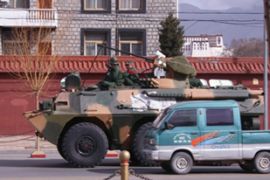Conflicting casualties
In neighbouring Sichuan province, rioting erupted on Sunday with pro-Tibetan protesters clashing with the police.
AFP news agency said at least seven protesters were shot dead by police.
A police officer told Reuters news agency that about 200 Tibetan protesters had hurled petrol bombs and burnt down a police station.
Chinese officials have so far confirmed that 10 people have died in the violence, but the self-declared Tibetan government-in-exile says the toll is as high as 80.
The Tibetan Centre for Human Rights and Democracy said in an email that thousands of monks of the Amdo Ngaba Kirti monastery in Sichuan had raised the banned Tibetan flag and shouted pro-independence slogans after morning prayers.
The unrest has drawn negative publicity for China as the country prepares to host the Olympics.
In Paris, scuffles broke out in front of the Chinese embassy after about 500 people demonstrated against China’s crackdown in Tibet.
About 10 people were taken away after riot police used tear gas to disperse the crowd.
On Sunday, China blocked access to Youtube when dozens of foreign news reports about the Lhasa demonstrations appeared on the popular US website.
The blocking added to the communist government’s efforts to control what Chinese internet users saw and heard about the protests.
Olympic controversy
|
|

1950 China invades Tibet
1959 Dalai Lama flees to exile in India after failed uprising against Chinese rule
1960s-70s Hundreds of monasteries destroyed during Chinese Cultural Revolution
1965 China announces creation of Tibet Autonomous Region
1989 Dalai Lama awarded Nobel Peace Prize for leading non-violent struggle for Tibet
2006 Opening of first rail line linking Tibet to rest of China
|
The Dalai Lama refrained from calling for a boycott of the games, as many Tibetan exiles have been demanding.
“The Chinese people… need to feel proud of it. China deserves to be a host of the Olympic Games,” he said.
He, however, said Beijing needed to be “reminded to be a good host of the Olympic Games”.
Violence erupted in Tibet on Friday just two weeks before China’s Olympic celebrations kick off with the start of the torch relay, which will pass through the region.
China’s communist government is hoping Beijing’s hosting of the Olympics in August will boost its popularity at home as well as its image abroad.
But the event already has attracted scrutiny of China’s human rights record and its pollution problems.
Calls for restraint
Condoleezza Rice, the US secretary of state, called on China “to exercise restraint in dealing with the protests”, while the state department issued a travel alert for Americans in the region.
Rice said she was “concerned by reports of a sharply increased police and military presence in and around Lhasa”.
Her statement called for China to release monks and others jailed for protesting.
Jacques Rogge, the president of the International Olympic Committee, said he opposed an Olympic boycott over Tibet.
“We believe that the boycott doesn’t solve anything,” Rogge told reporters.
“On the contrary, it is penalising innocent athletes and it is stopping the organisation from something that definitely is worth organising.”
A meeting of the standing committee of the Tibet Communist party, the ruling body in Tibet, said efforts had to be made “to expose and criticise the evil acts done by the hostile forces and expose the ugly feature of the Dalai (Lama) clique”.
In a statement on the Tibet Daily website, the group urged swift action against Tibet’s independence movement.
It said the government should “unite all forces that can be united to wage a people’s war against anti-splittism and to maintain stability”.
On Sunday, the 11th Panchen Lama Gyaincain Norbu condemned the riot in Lhasa, saying the sabotage acts run counter to the Buddhism tenets.
Norbu, Beijing’s choice as the reincarnation of the second highest ranking Buddhist figure, said the rioters’ acts “not only harmed the interests of the nation and the people, but also violated the aim of Buddhism.
 |
The unrest has created negative publicity for
China ahead of the Beijing Olympics [AFP] |
The unrest in Tibet began last Monday on the 49th anniversary of a 1959 uprising against Chinese rule of the region.
Tibet was effectively independent for decades before communist troops entered in 1950.
The protests by Buddhist monks spiralled to include cries for Tibet’s independence and turned violent when police intervened.
Pent-up grievances against Chinese rule came to the fore, as Tibetans directed their anger against Chinese and their shops, hotels and other businesses.
The details emerging from witness accounts and government statements suggested Beijing was preparing a methodical campaign – one that if carefully modulated would minimise bloodshed and avoid wrecking Beijing’s grand plans for the Olympics.
Law-enforcement agencies in Lhasa issued a notice offering leniency for demonstrators who surrender before the end of Monday and threatening severe punishment for those who do not.



